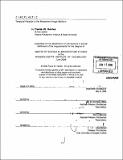Cineplastic : temporal paradox in the movement-image medium
Author(s)
Hanks, Travis W. (Travis Wesley)
DownloadFull printable version (21.56Mb)
Other Contributors
Massachusetts Institute of Technology. Dept. of Architecture.
Advisor
Ann M. Pendleton-Jullian and Mark Goulthorpe.
Terms of use
Metadata
Show full item recordAbstract
It could be argued that the term 'digital' as a prefix to architecture is evidence that contemporary design practice is lost in time. Modernity's predilection of spatial constructs over temporal ones continues to cast a lingering epistemological shadow regarding a theory of event in design processes. The impossibility of 'empirical data' as given and fixed in design 'strategies' is further complicated by the contingency of forms developing in time. Design intuition must be more than simply the ability to 'choose' from an auto-generated taxonomy of pre-rationalized forms. 'Framing' as the re-assertion of subjectivity within the 'automatic' processes of photography and film has yet to find a substantive architectural equivalent which allows intuition to intrude, interrupt, contaminate, and guide processes throughout. Captivated in a mode of production characterized by a continuous unfolding of fluid form, architects look for a way out of time. Yet, perhaps the simultaneity of parallel duration cannot (and should not?), be completely reconciled with the discreet and serial computational model.
Description
Thesis (S.M.)--Massachusetts Institute of Technology, Dept. of Architecture, 2006. Includes bibliographical references (leaves 76-78).
Date issued
2006Department
Massachusetts Institute of Technology. Department of ArchitecturePublisher
Massachusetts Institute of Technology
Keywords
Architecture.